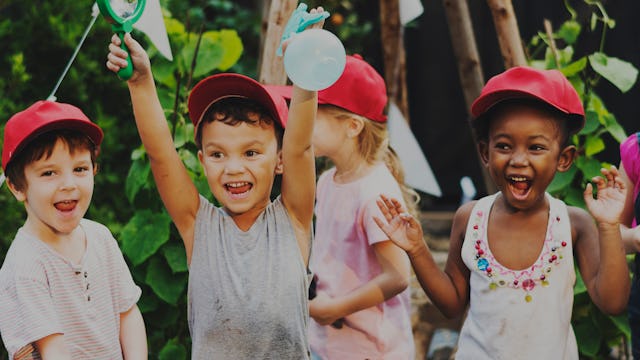The Summer Slide Is Real, But That Isn't A Bad Thing. Here's Why.

Summer break. For most of us, those two words bring on a much-needed sigh of relief. For 10 weeks or so, we all get a glorious break from the routines of the school year. No more early wake ups or stressful, rushed mornings. No more volunteering, parent-teacher conferences or mandatory recital attendance. No more homework or class drama – and no more learning.
At least that’s what the experts will tell you. Looking at it from a purely academic perspective, they’re not entirely wrong. The much-hyped idea of the summer slide or learning loss is real. Research shows that kids do in fact lose about two months worth of math facts and that lower-income kids also lose some reading proficiency.
There’s some debate as to why the slide is so dramatic. Some educators believe it’s because our system emphasizes schooling over learning. Think of “schooling” as training: students are exposed to a set of subjects (not of their choosing) in a particular way with the specific goal of performing well when tested. Yes, they’re reading and doing math problems, memorizing and regurgitating facts as needed to write essays or solve equations.
But they aren’t necessarily retaining that information very well. Learning happens best when it’s self-directed and kids are interested and engaged. Information is harder to hold on to if it was never really internalized in the first place. Thus, the so-called “summer slide.”
There’s plenty of hoopla out there about how to prevent this learning loss. Academic camps abound. Study centers offer summer tutoring “opportunities.” Unless you’re ready to shell out big bucks for these programs – and your kid actually wants to sit at a desk all summer – or you’re prepared to home school, ignore it.
Kids learn plenty during the summer. In fact, with the freedom to choose what they want to do and how and when they want to do it, they might actually be learning more deeply than they do during the school year.
There are all kinds of ways to learn. Just because school’s out doesn’t mean our kids stop learning. It’s just a different way of learning that isn’t about math facts and reading logs. Hanging out with the neighborhood kids and figuring out what to do as a group fosters social and collaboration skills. Tackling that tall tree, even though it’s scary, is about learning to take risks, building confidence and recognizing limits. And if your kid complains about having nothing to do, studies show that being bored is an excellent gateway to creativity.
Summer is a time for kids to explore what they really love, even if that’s sleeping in until noon every day (extra sleep is great for developing brains, by the way). Without the responsibilities of school taking up their mental space, kids are free to think about what they want to do, direct their own days and really engage in what they’re doing. That deeper engagement means their brains are more likely to grasp and hold on to new information, both physical and intellectual.
Learning how to steer a raft is as worthwhile as reading about Huck Finn doing it. Obsessing about the secret life of hedgehogs, even if it means putting off the summer reading list, is awesome, as long as your kid’s digging it.
If you’re still concerned, consider this: many of our daily activities incorporate basic school learning in some way. When your child bakes, they’re calculating measurements and time. When your kid plays a video game, they are keeping track of points, coins or lives, earning and losing them as they goes. Once we learn how to read, we do it automatically whenever we see words, whether we pick up a book or read street signs as we go by them.
Summer is a time to let kids be kids. They spend most of the year in a traditional classroom following a set curriculum. They’re asked to sit for most of their day and pay attention to information that may or may not be interesting them. Summer break is supposed to be exactly that, a break.
Instead of worrying about how much schooling kids lose over the summer, think about everything they gain. Maybe they made a new friend or learned a new skateboard trick; maybe they ran a 5K or earned a new power in their favorite game. Maybe they slept in everyday and smile more because they’re finally feeling well rested.
It’s highly probable that our kids will forget their 12 times tables or how to spell “spectacular.” Not everyone is okay with that. Parents worry their kids are falling behind and teachers lose valuable teaching time to review. These concerns are valid, but we can’t keep thinking of summer as only a time of learning loss because there is also so much our kids gain during those months of academic freedom.
Childhood is an excellent classroom – books and screens optional.
This article was originally published on